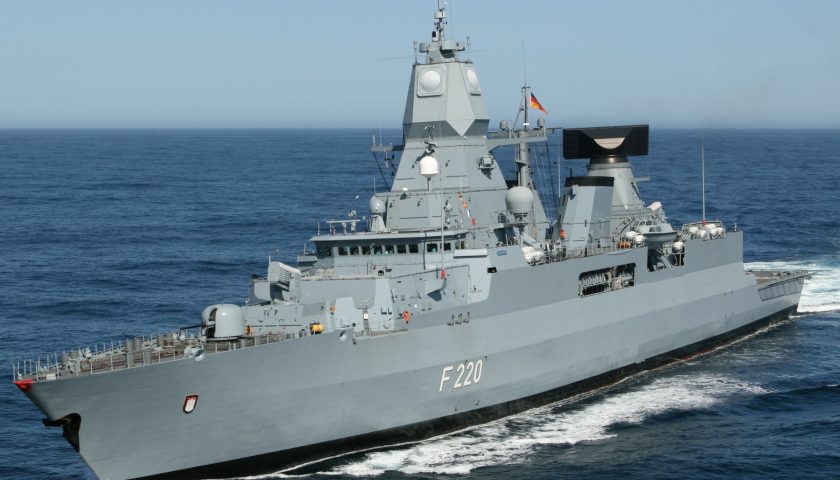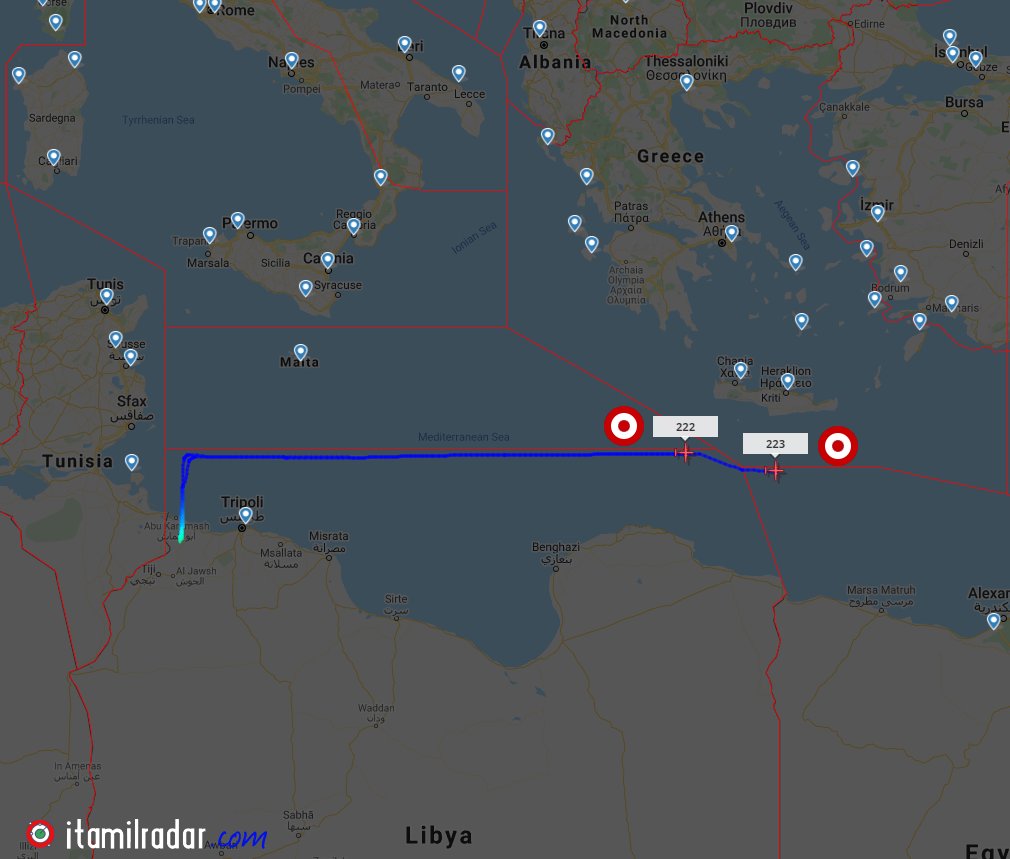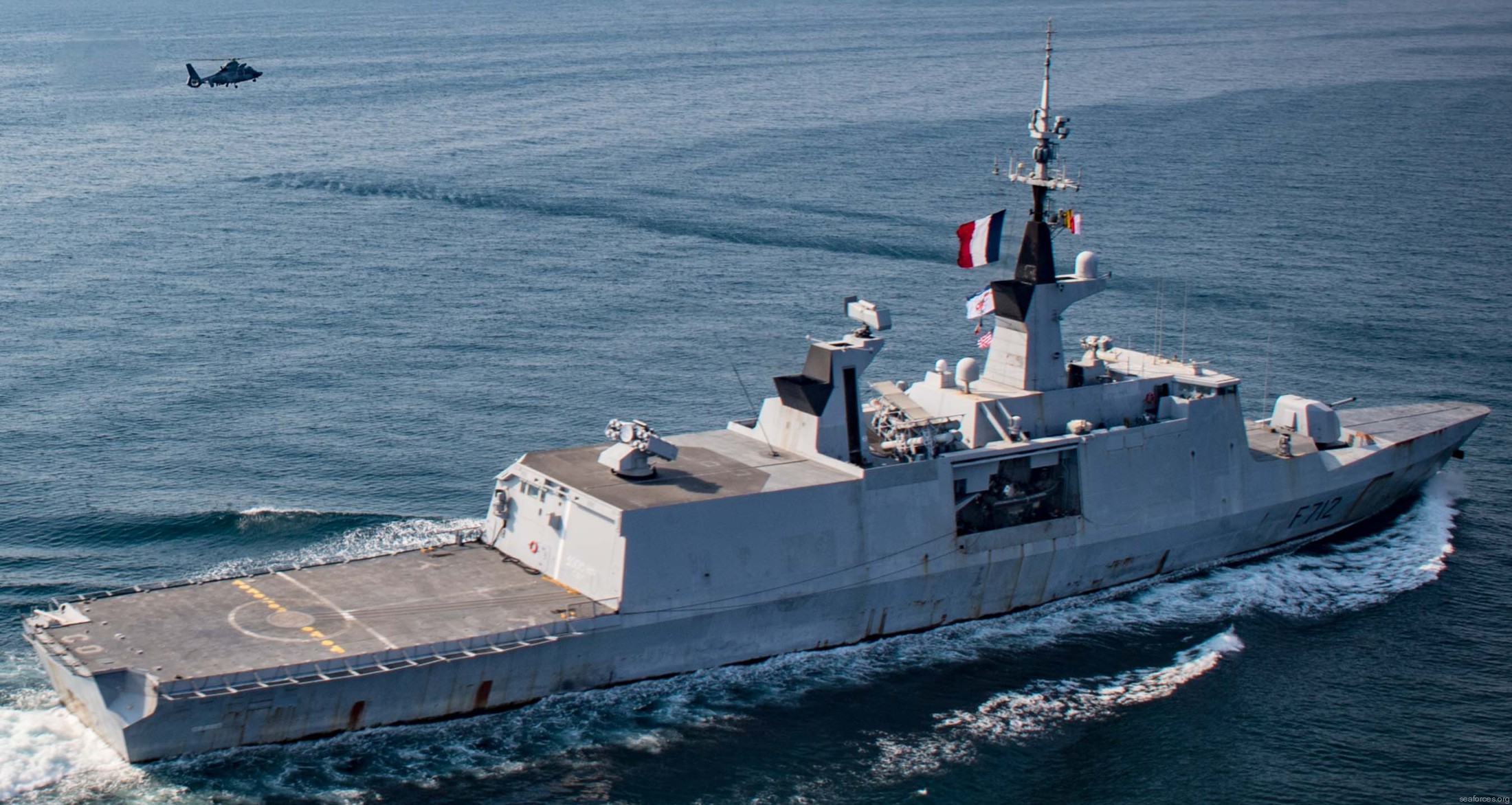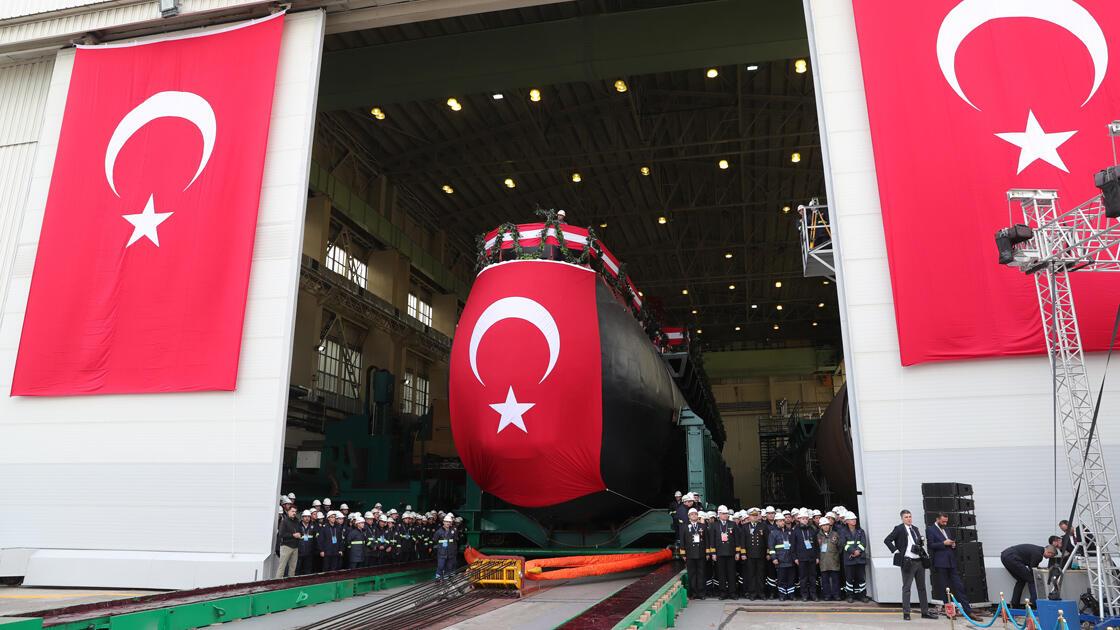Despite the threat of sanctions, Turkey is provoking, one more time, serious new tensions with Germany and the EU by targeting EUNAVFOR MED “IRINI”. Turkish prosecutors launched an investigation into the search of the Turkish commercial freighter by the crew of a German frigate participating in a EU mission to enforce the arms embargo on Libya.
Anastassios Tsiplacos - Managing Editor
The crew of the Bundeswehr frigate “Hamburg” stopped the Turkish freighter “Roseline A” a good 200 kilometers north of Benghazi in the Mediterranean Sea and announced the inspection through several diplomatic channels to Turkey, under whose flag the ship was sailing.
According to the Bundeswehr, Ankara forced the termination of the deployment of German Marines to control the UN arms embargo against Libya. EU diplomats interpeted the harsh reactions as an indication that the suspicion about the illegal cargo was correct. From security circles it was said that the EU mission had had the ship in its sights for a long time.
Sharp criticism came from the Bundestag. In Brussels it was pointed out that the next EU summit on December 10th and 11th would discuss possible further punitive measures against Turkey. Germany’s attitude, “protector” and major business partner of Turkey, is anticipated with great interest, especially from France, Greece and Cyprus.

When, back on June, we published our first analysis about EUNAVFOR MED “IRINI” (see: OP “IRINI”: The Force that watched arms go by incompetent or unwilling to take action…) we wrote that: “It was, perhaps, prophetic that EUNAVFOR MED “IRINI” was launched on April 1st “Fools Day”. Right from its start, came under fire by Libyan officials of the Government of National Accord (GNA).
The Turkish Defense Minister Hulusi Akar also accused the EU that the Operation “IRINI” holds no legal grounds, as it is run without any official request from the legitimate GNA. He explained that the control on access by sea cannot be considered an arms embargo, rather a block on legitimate government activities, whilst lending support to Haftar’s forces and indicated that some European countries are not willing to be part of “IRINI”, calling the operation’s member states to review their stances in supporting warlord Haftar against the GNA.”

It was 5 months later that Germany, an avid “protector” and considerable business partner of Turkey, accused Ankara of preventing German forces belonging to EUNAVFOR MED “IRINI” from fully searching the Turkish cargo ship, a move Turkish officials reiterated that it was a violation of international law.
The 16,000-tonne container “Roseline A” left the Turkish port of Gemlik near Bursa last week, and was last seen heading southwest towards Libya. The German Defence Ministry announced that Marines from the frigate “Hamburg” boarded the Turkish freighter overnight, but the investigation had to be stopped, as Ankara lodged a sharp diplomatic protest about five hours after the announcement of the inspection. At this point in time, the German soldiers had only checked a few of the 150 or so freight containers on board, but found no weapons. The frigate was operating in the Mediterranean as part of EUNAVFOR MED “IRINI” mission, which aims to stop arms reaching Libya, where Turkey backs the internationally recognised government in its fight against Russian and Egyptian backed rebels in the country’s east.
Ankara: “Greek-led EU mission illegally searches Turkish ship”
Turkey said the “Hamburg”, serving under the Greek-commanded EU naval mission, violated international law by not waiting for permission to board. Even more, in what was seen as an attempt to push the narrative of Athens fueling tensions, Turkey’s President Erdogan suggested that Greece and Cyprus were behind the interception the Turkish vessel. “Despite the provocations by Greece and the Greek-Cypriot administration (the Republic of Cyprus) on the eastern Mediterranean issue, we have reacted with patience and restraint,” Erdogan told MPs of the ruling party. “However, despite our patient and restrained attitude, they recently raided our freighter that was transporting cargo to Libya. This was not in line with the international law of the sea. Once again, the captain of the ship that conducted the operation was a Greek national. When they boarded the ship, they harassed the crew,” Erdogan claimed, avoiding to refer to the German marines or the Italian commander of EUNAVFOR MED “IRINI”.

Greece in Erdogan’s sights…
From the beginning of the year, when Greece blocked Recep Tayyip Erdogan’s attempt to blackmail Europe with the mass movement of migrants, Turkey has been trying, with increasing persistence, to “isolate” Greece from its European Union partners.
At first, Turkish officials encouraged and amplified claims of Greek authorities’ alleged mistreatment of migrants. Then, they presented Greece as the part responsible for Turkey’s violations of international law: After sending exploratory vessels, accompanied by warships, into waters near Greek islands and into Cyprus’ EEZ, Ankara claimed that it was defending its rights against Greek and Cypriot intentions.
In his clash with Emmanuel Macron, President Erdogan threatened the Greeks that they would “pay a high price” for allying themselves with France. So, it was natural that he should blame Greece for the German frigate’s inspection of the Turkish ship suspected of breaking the United Nations arms embargo on Libya.
The EUNAVFOR MED “Irini” is under the rotating leadership of a Greek commander. Because it does not suit mr. Erdogan to pick a fight with Germany, a couple of weeks before the European Council is to discuss possible sanctions against Turkey, he chooses to focus on the Greek commander, and, thereby, Greece, rather than on the EU mission itself. If sanctions against Turkey are ever adopted, the Turkish public will be sure that this is the fault of Greece and Cyprus, not of Turkey’s policies.
The problem is that although this trick is not as successful as he would like, the continuous attacks on Greece are enough for some in Europe to believe that things may be more complicated than they actually are -one country violates international law and continuously threatens others with violence. Furthermore, the continual attacks against the Greeks stoke the fire of Turkish nationalism, which, in turn, provokes reactions and alarm in Greece.

The narrative of Greece being behind the search of the Turkish ship was also pushed by pro-government Turkish media, writting “The Navy is on alert, because the commander of the invasion was Greek. Retaliation against Greek merchant ships in the Eastern Mediterranean is being considered as a possibility. In the Eastern Mediterranean, where Greek-flagged merchant ships operate intensively, the requirements of the principle of reciprocity are on the table, as an applicable card, as required by international law. The Turkish navy’s military ships off Libya were also vigilant against possible new harassment and provocations after the incident.”
Furthermore, Turkey’s National Security Council announced that Ankara will take necessary steps in every field against the EU’s Operation “Irini”. A statement issued after a meeting strongly condemned the unlawful search of the ship and the unilateral act which was completely against international law and principles of alliance relations.
Turkey released footage showing armed men in military uniform marshalling sailors with their hands on their heads, on the bridge of what it said was the “Roseline A”.
The Turkish Foreign Ministry described the operation as illegal and accused the Bundeswehr of having used force against the civilian team. Even President Erdogan spoke of harassment by the German soldiers. Foreign Minister Mevlut Cavusoglu said in a statement that Operation “Irini” is a biased mission that targets Turkey and the internationally recognized Government of National Accord (GNA) in Libya.“Turkey will respond appropriately to Operation Irini’s illegal search of a Turkish vessel on the field… We will do whatever is necessary, as ordered by the President,” he concluded.
On top of all this, in a bid to raise the stakes with Turkey’s political scene, Turkish prosecutors launched an investigation into the search of a Turkish commercial freighter by the crew of the German frigate. In a brief statement announcing its investigation, the Ankara Chief Prosecutor’s office said the search was conducted without “Turkey’s authorization and against international regulations.” The probe is not expected to lead to arrests or the extradition of officials involved in the search.

The Turkish Press Agency “Anadolu” posted the following analysis:
“IRINI has become a clear manifestation of how some members of the Union have taken hostage the EU27 leadership for the sake of their narrow-sighted interests in the Eastern Mediterranean. In the simplest terms, this raid under the guise of “inspection” is a state-sponsored piracy.
Not surprisingly, Stephanie Williams, the UN deputy special representative to Libya, confessed at the Munich Security Conference held in February 2020 that the arms embargo had become a “joke”…
…It has not been long since militias loyal to Haftar and to his ardent supporter President Macron of France overtly violated the arms embargo and blocked the oil exports from Libya’s main ports on the eve of the Berlin Conference, which was organized in order to safeguard the arms embargo. Bearing in mind that these inflammatory actions persistently continue, the recent hostile action against Turkey under the guise of IRINI has eventually revealed a contemporary debate in international law: maritime zones and freedom of navigation on the high seas.
The EU, once again, remained indifferent towards a flagrant violation of the freedom of navigation of a Turkish ship carrying humanitarian aid, while disregarding that freedom of navigation on the high seas are rooted in the “Mare Liberum” (Latin for “freedom of the seas”) doctrine of the Dutch philosopher Hugo Grotius.
It is a shame that the EU member states, particularly Germany, the current term president of the Council of the EU, saw no harm in infringing upon the Westphalian principles. It is also an unfortunate development that the raid happened in the wake of President Erdogan’s G20 address in the virtual summit presided by Saudi Arabia. It is noteworthy that one of the things made clear by Erdogan in his statement was that Turkey contemplated a future with Europe…
…The EU remained insistent on ignoring the fact that it does not have any jurisdiction over the maritime areas in the Eastern Mediterranean, which is a basic interpretation of EU law; now the Union undeniably shares the responsibility of the violation of international law with its member states. State-sponsored piracy in opposition to the freedom of navigation on the high seas should not be the modality of ensuring the sovereign rights of the EU member states.”
“Everything went exactly according to protocol”…
The German Defense Ministry said Turkey’s protest against German marines boarding the Turkish vessel on behalf of the EU military mission in the Mediterranean is unjustified. Turkey was informed about the plans for the search of the ship. The boarding party had sought permission and only after four hours had passed with no reply, it was standard practice to believe there was implicit permission.

The German soldiers boarded and searched the “Rosaline A” freighter because of suspicions it was smuggling weapons to Liby “The soldiers behaved correctly and acted absolutely in line with the mandate of the European mission Irini,” German Defense Minister Annegret Kramp-Karrenbauer stated. The search was ended when word came from Turkey that it refused permission and that no forbidden goods were detected, by the time they were ordered off the ship. “Everything went exactly according to protocol” a German Foreign Ministry spokeswoman said.
Satellite images suggest weapons smuggling on the Turkish freighter
In the dispute over the Bundeswehr’s inspection of the Turkish freighter “Roseline A”, the suspicion of arms smuggling is reinforced. According to SPIEGEL information, the EUNAVFOR MED mission “Irini” had concrete information on this. Before the scandal surrounding the inspection of the Turkish freighter, the military had much more concrete evidence of illegal arms smuggling. Analysts from the EU mission “Irini”, had identified on satellite images of the ship’s previous port stay in Misurata, Libya, that armored military vehicles had been unloaded.

In addition, during the recent port visit of the “Roseline A” in the Turkish port of Ambarli in November, surveillance images revealed that suspicious goods had been brought on board again. The Turkish freighter had set off from Turkey to Libya at least eight times this year alone. In addition to Misurata, she also called at Chums and the capital Tripoli. Thereupon the leadership of the “Irini” mission decided to have the ship checked.
The EUNAVFOR MED “IRINI”
Operation EUNAVFOR MED “IRINI’s” core task is the implementation of an arms embargo through the use of aerial, satellite and maritime assets in order to support the process to bring stability in Libya and peace to its population. It is a part of the EU’s commitment to support the Berlin process. For Germany, France and Italy, a solution to the Libya conflict is important because the chaotic conditions favor the business of smugglers, who illegally bring migrants to Europe across the Mediterranean.
The operation is able to carry out inspections of vessels on the high seas off the coast of Libya, suspected to be carrying arms or related material to and from Libya, in accordance with relevant United Nations Security Council Resolution (see: OP “IRINI”: The Force that watched arms go by incompetent or unwilling to take action…)
Whether the NATO country Turkey used its veto option against the search because the “Rosaline A” really had weapons or other prohibited goods on board, remained unclear at first. Nevertheless, it is certain that they surely wanted to express their resistance to the EU operation “Irini”, which is regarded as “illegal”. This is also supported by the fact that the boarding order was given by the Greek fleet commander of EUNAVFOR MED “IRINI”. The German frigate, however, had received the reference to the “Rosaline A” from the headquarters of the mission, which is currently being led by an Italian admiral.

Turkey makes no secret of the direct support of the internationally recognized government in Tripoli and sends weapons and mercenaries with ships and airplanes. The Turkey airlifts to Libya continued with an Airbus A400M (17-0078) from Kayseri AB and directed to western Libya. Another TuAF A400M (16-0055) departed from Konya AB to Misrata.
Ankara has blocked EU inspections off Libya’s coast many times in the past…
The recent incident shows once again how difficult it is to curb the smuggling of arms into Libya. Operation “Irini” should at least make the route of arms across the Mediterranean a little more difficult.
According to “SPIEGEL’s” information, in September the same German frigate “Hamburg” discovered kerosene, that is only used for fighter jets falling under the arms embargo, while inspecting a Turkish tanker on its way to Libya, coming from the United Arab Emirates. In addition, EU sanctions were recently imposed on companies that have provided ships, aircraft or other logistics for the transport of war material. Specifically, it is about three companies from Turkey, Jordan and Kazakhstan.
There were also two almost identical incidents in late summer with the Hellenic frigate “Spetsai” and the French “Courbet”, with the latter being the cause of France’s departure from NATO’s operation “Sea Guardian” (see: OP “IRINI”: The Force that watched arms go by incompetent or unwilling to take action…).

The Hellenic Navy’s MEKO200HN class frigate “Spetsai”, which was monitoring the movements of a Tanzanian-flagged Turkish ship suspected of carrying military equipment, sailing southwest of Crete in the direction of northwest of Benghazi, accompanied by three Turkish frigates. “Spetsai” sent its Sikorsky S-70B helicopter to fly over the suspicious cargo ship and requested the crew’s cooperation to a VBSS (Vessel Boarding Search & Seizure) operation on the basis of the mandate of the EUNAVFOR “Irini”. There was no response from the cargo ship to the repeated calls from the pilots of the Greek helicopter. A few minutes later, one of the three Turkish frigates responded that the ship was under the protection of the Turkish Republic. In this way, the Turks refused the VBSS operation, indirectly confirming what its cargo really is. So, the frigate “Spetsai” was ordered to discreetly monitor the course of the cargo ship as it approached the shores of Libya.

A same incident occured when France has been especially agitated after accusing Turkish warships of being aggressive towards its La Fayette class frigate “Courbet”, after it tried to inspect a vessel in June that it suspected was violating a United Nations arms embargo on Libya. On June 10, the Turkish vessel “Cirkin” had “…switched off its tracking system, masked its ID number and refused to say where it was going” the French Armed Force Minister Florence Parly said, while accusing the Turkish Navy escorts of using NATO call signals to cover for the Tanzanian-flagged cargo ship and flashed their radar lights three times at the French warship.
The “Courbet” was operating in the NATO’s “Sea Guardian” operation. The French Ministry of Armed Forces accused the Turkish Navy of harassing the French warship (see: France, Turkey, NATO & Libya…)
Sharp criticism from the Bundestag
The recent incident coincided with the revelations that the German arms industry had been exporting warships or parts for them worth €1.5 billion to Turkey since 2004. Such arms deliveries are now highly controversial, because of the conflict between NATO partners Greece and Turkey over natural gas reserves in the eastern Mediterranean. So far, the federal government has only prevented the export to Turkey of armaments that could be used in the Syrian war. However, exports for the “maritime sector” will continue to be approved and exported.
A few weeks ago, the government of EU partner Greece asked Germany to extend the export ban to warships. This applies in particular to the construction of six 214 class submarines, which are being assembled in Turkey with the major participation of ThyssenKrupp Marine Systems.

Consequently, sharp criticism of Turkey’s actions came from the Bundestag on Monday. The FDP politician Marie-Agnes Strack-Zimmermann called on Federal Foreign Minister Heiko Maas (SPD) to take a stand immediately. “It is absurd that Turkey tries again and again to obstruct the control of its ships,” criticized the defense policy spokeswoman for the FDP parliamentary group. “If we let that happen, we can end the mission.” The left-wing politician Sevim Dagdelen demanded that as a consequence of the events, the federal government must finally stop arms exports to Turkey and all other “Libya arsonists”.
Europe’s ambivalence…
Despite the threat of sanctions, Turkey is provoking serious new tensions with Germany and the EU. In late October, the European Union castigated Ankara’s provocations as “totally unacceptable.” However, decision-makers agreed to postpone any decision on sanctions against Turkey until the EU summit in December.
France’s leading efforts to push for European sanctions on fellow NATO member Turkey has picked up steam lately, with Paris expected to propose the punitive action with the backing of Greece and Cyprus, but so far with lack of enthusiasm from other EU governments. Paris says Turkish President Erdogan has not heeded EU leaders’ warnings on October 1 to back down in a dispute over gas exploration in the Mediterranean or face consequences.

France’s Foreign Minister Jean-Yves Le Drian issued a bit of an ultimatum at a French parliamentary hearing this week: “Confrontation or collaboration, it’s up to them,” he said. Various EU diplomats, however, have underscored that “Turkey is a key partner in many areas, so there’s no consensus in the Council (of EU governments). It is still too early” -which suggests a likely uphill battle before any European sanctions actually become a reality. That is why the French minister made a point of saying that possible sanctions against Turkey may be individual or partial and may affect particular sectors of the Turkish economy, but will not go as far as to end the EU-Turkey customs union.
France in the past months has gone so far as to join naval and aerial exercises with the Greek and Cypriot armed forces in the Mediterranean as a “warning” to Turkey. In fact, at the time of writting, it announced its participation to the multinational aeronautical exercise “MEDUSA 10/2020”, off the coast of Alexandria, together with Egypt, Greece, Cyprus and UAE. Nevertheless, Erdogan has appeared undeterred.
It is undoubted that the European differences -especially Germany- stand in the way of a firm stance against Turkish harassment, despite a general agreement on condemning Turkey’s “…provocations and systematic aggression” at European borders i.e. Greece and Cypru’s EEZs.
Previously, the EU had adopted a tougher attitude toward major powers, such as Russia. But the sensitivity of relations with Turkey makes this attitude understandable: Turkey is holding the EU hostage over refugees and other issues, such as NATO membership. Brussels is reluctant to impose sanctions on a strategic partner as the implications could involve a scenario of freezing, if not breaking up, the alliance.
Furthermore, the EU sees the time factor and the strategic setting whereby all economies are facing the coronavirus pandemic as particularly sensitive. As such, it is difficult to make political decisions on economic and trade sanctions or suspensions.

The problem is that President Erdogan does not perceive European patience with a conscious political vision. He sees it as a sign of weakness and pursues his provocation. He hopes to gain popular support to offset his waning popularity at home and divert attention from the nosediving Turkish lira and economy.
Today there isn’t any European country that has any illusions about who mr. Erdogan and his regime are. Europe must be clear that the downward slide of the Turkish President’s regime into economic doldrums, will get him to make more provocations over the coming period, unless there is a firm European standpoint to put them off. Its record economic and political decline should prompt the Turkish President to ramp up more military adventures…






